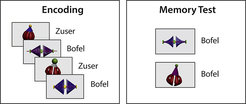Early Language Development in Fast Motion: How Sounds Become Words during Sleep
Babies succeed much earlier than previously thought in assigning meanings to words—and do not only perceive words as pure sound patterns.
Babies are exposed to a large amount of stimulation. Since no two situations are exactly the same, for babies every moment is a completely new experience— until the infant brain organises the flood of stimuli. It has to save new information in long-term memory, to aggregate similar experiences and to categorise them. For these processes, sleep seems to be crucial. Researchers at the Max Planck Institute for Human Cognitive and Brain Sciences (MPI CBS) in Leipzig together with colleagues from other institutions have now discovered that, during sleep, babies can even create word meanings—much earlier than previously supposed.

While sleeping, babies pass through stages of early language development: from initially built associations of word sounds with visual patterns they create real words with meanings. © shutterstock
While babies sleep, fascinating processes take place in their brains. Scientists at the Max Planck Institute for Human Cognitive and Brain Sciences (MPI CBS) in Leipzig observed that six- to eight-month-old babies succeed in creating a meaning for a word—a capability that, until now, has been attributed only to older children and adults. During sleep, the memory for word meanings passes through the same stages as during typical lexical development: So-called protowords that initially associate simultaneously occurring visual and acoustic stimuli become real words that are already bound with meanings.
The scientists investigated these processes by exposing six- to eight-month-old infants to fantasy objects which they gave fantasy names such as “Bofel“ or “Zuser“. Objects that differed only slightly in form and colour were given the same names—just as all cats are called “cats” although they differ in their specific features. The researchers chose these fictitious objects to make sure that the young study participants could not use already existing knowledge.
The infants’ brain responses revealed that the babies did not assign new objects of the same category to the corresponding name. That means they did not recognise a new Bofel as a “Bofel” although it was quite similar to the previously seen Bofel versions. For the babies, every new object–word pair was unknown and unique, they did not yet see the general relation between the similar pairs.

After a midday nap, babies are able to generalise the word label to new exemplars. Their brains differentiate between the correct and the incorrect label for a new version of a "Bofel" and a "Zuser". © MPI CBS
This changed after a midday nap. In babies who had napped after the learning phase, the brain differentiated between the right and wrong name for a new object in the subsequent test phase. These babies had generalised their knowledge while sleeping. Babies that had stayed awake could not manage to do so.
Interestingly, the babies developed two different types of knowledge depending on the duration of sleep. After a half-hour nap they showed a brain response that is known from three-month-olds, when these infants associate visual object stimuli with acoustic patterns of words. Thus, during their short nap the babies had filtered out similar features of the objects and had associated them with the sounds of the words. However, similar to the three-month-old babies, they perceived a word only as a sound without meaning.
In contrast, babies who slept for about 50 minutes showed a brain response that was previously known only from older children and adults. The so-called N400 component observed here signals that incongruous meanings are processed in the brain—whether it be in sentences, word pairs, picture stories or object–word pairs. On the basis of this component the researchers realised that the young participants had in fact created meanings of the words.
“Our results show that infants can form long-term memory for word meanings much earlier than previously thought. Even though the brain structures that are relevant for this type of memory are not fully matured, they can already be used to a certain extent”, explains Angela D. Friederici, director at MPI CBS and senior author of the underlying study which has recently been published in Current Biology.
In this context, one particular stage of sleep was important: The duration of the second of the four sleep stages seems to have the main impact on the development of lexical memory. “During this stage of light sleep, evidently the transition from a simple early developing form of lexical memory to an advanced later developing form of memory takes place”, says study leader Manuela Friedrich. “The two types of memory, which successively emerge during sleep, are comparable with those that we know from infant lexical development. However, during sleep there are just minutes between them, whereas during typical development there are months.” Accordingly, memories appear to be formed in fast motion during sleep.
“In our study, however, infants were exposed to a large amount of information within a narrow time frame, which they normally experience over a much longer period of time”, Manuela Friedrich adds. “But only during sleep, when the infant brain is isolated from the surrounding world, can it extract and save relations incorporated in this information. And only the interaction of an alert state of experiencing the environment with the offline state of sleep, in which experiences are organised and stored, enables early cognitive and language development.”













